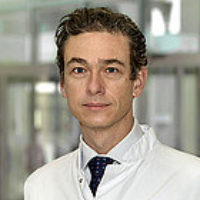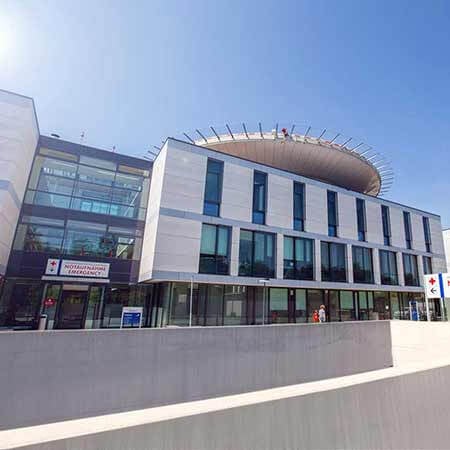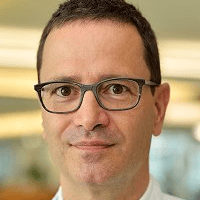Surgical Removal of the Tumor (total — Partial) for Meningioma in Germany
Treatment prices are regulated by national law of the corresponding countries, but can also include additional hospital coefficients. In order to receive the individual cost calculation, please send us the request and medical records.

Department of Adult and Pediatric Neurosurgery, Spinal Surgery
The Department of Adult and Pediatric Neurosurgery, Spinal Surgery offers all the possibilities of modern surgical treatment for diseases of the central and peripheral nervous system in patients of all ages. More than 6,000 surgical procedures are performed annually in the department's high-tech operating rooms. Both planned and emergency neurosurgical procedures are performed here. The department's surgical team focuses on patients with cerebrovascular diseases, brain and skull base tumors, spine and spinal cord diseases, cerebrospinal fluid circulation disorders, and pathologies of the peripheral nervous system. The department's team of physicians also has extensive experience in functional neurosurgery: specialists perform deep brain stimulation for movement disorders, spinal cord stimulation for back pain, and vagus nerve stimulation for epilepsy. The department works closely with neurologists, radiologists, and nuclear medicine specialists to provide patients with the highest level of comprehensive medical care. The department is recognized as one of the top neurosurgical centers in Germany and beyond, as evidenced by consistently high treatment success rates and numerous quality certifications, including the German Cancer Society (DKG) Certificate, the German Spine Society (DWG) Certificate, and the Leading Medicine Guide Certificate.







Department of Adult and Pediatric Neurosurgery
The Department of Adult and Pediatric Neurosurgery offers the full range of surgical treatment of diseases of the brain, spine, spinal cord and nerves in adults and children. The department keeps pace with new trends in medicine, as well as contributes significantly to their development. Therefore, the most modern diagnostic and therapeutic methods are available here. An individual approach to each clinical case is crucial to ensure optimal treatment results with the preservation of all neurological functions.


Department of Adult and Pediatric Neurosurgery
According to the Focus magazine, the Department of Adult and Pediatric Neurosurgery ranks among the top German medical facilities specializing in the surgical treatment of brain tumors! The department offers the full range of diagnostics and surgical treatment of diseases of the central and peripheral nervous system. A specially trained team of pediatric neurosurgeons provides treatment for various neurosurgical pathologies in children. During the treatment, the doctors use state-of-the-art equipment, in particular, imaging-guided neuronavigation, functional imaging (fMRI), intraoperative mapping, intraoperative videoangiography, etc.






Meningioma is a brain tumor that grows from the arachnoid membrane. Surgical treatment of meningioma is the first-line therapeutic option. Since meningiomas are mostly benign and small, the disease can usually be cured completely. It is important to avoid worsening of the neurological deficit and developing serious complications after the intervention. In order to make the treatment effective and safe, you can undergo it in Germany.
Who needs surgical treatment for meningioma?
Surgical treatment of meningioma is the main method of managing the disease course and symptoms. The operation is indicated for all patients with this pathology. Radiotherapy is sometimes performed after it.
Some tumors cannot be treated with surgery. These are small meningiomas that are located in the hard-to-reach regions. In this case, stereotactic radiotherapy is used to suppress the tumor growth.
Some patients have contraindications for surgical treatment of meningioma. Some patients refuse the operation. In such situations, radiation therapy becomes the main method of treatment. It can reduce or stabilize the tumor growth.
What is the aim of the surgical treatment of meningioma?
The meningioma can be treated surgically for different purposes, including:
- Complete cure of the disease
- Removal of part of the tumor to stabilize the patient's condition
- Relief of symptoms and prevention of fatal complications
- Improving the patient's quality of life
- Increasing the life expectancy
When achieving the aims, the healthcare professionals pay attention to not harming human health, not causing significant neurological deficits or mental disorders due to damage to healthy tissues of the central nervous system.
If possible, the doctor removes the entire neoplasm so that the disease does not return after treatment. If the total surgical removal of a meningioma is life threatening or can aggravate neurological deficit, the doctor shifts to the partial resection (removing a part of the tumor).
Peculiarities of the surgical treatment of meningioma
Meningioma has certain features that distinguish it from other brain neoplasms. It is often benign and grows slowly. The tumor is connected to the dura mater and bone. Its borders are usually distinct, most meningiomas have a capsule.
Success of the surgical treatment of a meningioma depends on a number of factors:
- Location of the tumor
- Degree of tumor malignancy
- Size of the neoplasm
- Density of the meningioma (some tumors become very dense due to ossification)
- Patient's health condition and neurological status
The surgical treatment of meningioma can be technically challenging, so the operation must be performed in a well-equipped neurosurgical department, by experienced specialists. With a location of the tumor in the hard-to-reach region, there is a high risk of damaging large vessels with severe bleeding, as well as damaging cranial nerves, and functionally important areas of the brain.
How is surgical treatment performed
The patient undergoes a preoperative examination. In addition to standard procedures aimed at assessing general health state, an MRI or CT scan of the brain is required. In Germany, doctors use magnetic resonance spectrography, angiography, and functional MRI before surgical treatment of a meningioma. These tests help to determine the type of tumor, the peculiarities of its blood supply, and the location of functionally important areas of the brain.
Surgical treatment of meningioma requires general anesthesia. The doctor performs osteoplastic craniotomy. The maximum possible volume of the tumor is removed. In Germany, a laser is often used in the surgical treatment of meningioma. With the help of a laser the neurosurgeon cuts dense tissues and coagulates the matrix (the part of the dura mater from which the meningioma grows).
Removal of the tumor is often complicated by severe bleeding. To avoid blood loss, the doctor can perform the embolization of large vessels before starting the operation. During the surgical treatment of meningioma, the surgeon ligates and coagulates the arteries and veins.
After removing the tumor, the doctor closes the defect in the dura mater and bone using the patient's own tissues or artificial materials. In the postoperative period, MRI or CT scan is performed to reveal possible complications, assess the results of the operation and the degree of cerebral edema.
Neuronavigation and intraoperative diagnostics
If the tumor is located in the hard-to-reach region (e.g. a meningioma of the base of the skull), neuronavigation is required to remove it surgically with minimal risk of complications. In Germany, the latest equipment is used that allows visualizing the brain directly during surgery, without using a stereotaxic frame.
Neuronavigation allows the following:
- Choosing the best surgical approach
- Reducing the patient's preoperative preparation
- Determining bone marks
- Avoiding the excessive bone resection
- Detecting vessels and nerves that are impossible to identify visually
- Reducing the risk of damage to large arteries, veins, and cranial nerves
During the surgical treatment of meningioma, German doctors identify functionally important areas of the brain. This is required to avoid their damage. Functional mapping and electrophysiological tests are carried out in Germany to improve the safety of the operation.
Operation results
The results of surgery are assessed using the Simpson scale and are numbered from 1 to 5. Their meaning is as follows:
1 — complete removal of the meningioma along with a part of the dura mater and pathologically altered bone
2 — complete removal of the tumor with coagulation of the matrix (the area from which it grows)
3 — complete removal of the meningioma without involvement (removal or coagulation) of the zone of its growth
4 — partial removal of the tumor
5 — decompression craniotomy
Operations 1 and 2 according to Simpson scale are considered total removal of the meningioma. They provide the best results. Other surgical procedures are considered subtotal. If the tumor cannot be removed completely, doctors use radiation therapy to avoid its continued growth.
The effectiveness of surgical treatment of meningioma depends not only on the skill of the surgeon, but also on the degree of malignancy of the neoplasm.
Most tumors are benign. The risk of their recurrence after surgery is 15% during 10 years. If the meningioma is removed totally, the probability of recurrence is reduced to 4% over the same follow-up period.
About 1 of 5 patients develops an atypical (grade 2) meningioma. This tumor recurs with a probability of 30% during 3 years, 38% during 5 years of follow-up.
Anaplastic meningioma has the worst prognosis. It develops in about 1 in 100 people with such diagnosis. After performing a total tumor resection, the five-year survival rate reaches 22%. Unfortunately, it is not possible to perform the operation in the optimal volume in all patients. The overall risk of recurrence during 3 years of follow-up is 98%.
The additional treatment
The additional treatment includes radiation therapy. It is necessary to stop the growth of the tumor and / or to reduce the risk of its recurrence.
Clinical situations, when radiation therapy is indicated, depend on the degree of the meningioma malignancy:
- Grade 1 — radiation therapy is not required, even if the operation is not performed in an optimal volume. The patient stays under medical supervision. The tumor is irradiated only if it grows.
- Grade 2 — radiation therapy is not performed with the total removal of the meningioma, but is necessary in all cases when the doctor was unable to perform resection 1 or 2 according to Simpson scale.
- Grade 3 — radiation therapy is always required, even with optimal meningioma removal.
Irradiation is performed once the patient has recovered. Radiation therapy is usually planned no earlier than in 4 weeks after the surgery.
The safest type of radiation that is available in Germany is proton therapy. Despite the high cost of treatment, it is preferable for meningiomas of the base of the skull and is often used in children.
Why is it better to treat meningioma in Germany?
German doctors carry out surgical treatment of meningioma more effectively and safely compared to the healthcare specialists from other countries. Here are several reasons to travel to Germany.
1. High-precision examinations for the diagnosis making. This allows doctors to determine the type of tumor, its location and shape even before the surgery. Doctors receive information about the blood vessels feeding the meningioma, located near it anatomical structures and functionally important areas of the brain.
2. Well-equipped hospitals. During the surgical treatment of tumors of the central nervous system, German doctors use modern operating microscopes, assisting equipment, and neuronavigation systems. Intraoperative diagnostics is also performed, if necessary.
3. Safety of the surgeries. Doctors in German hospitals do not strive to remove the meningioma at any cost. They pay attention to avoiding damage to large nerves, blood vessels and functionally important areas of the brain, so as not to cause severe neurological deficit and worsen the quality of patients’ life.
4. Complete cure of the meningioma. In the majority of cases, doctors in German hospitals remove the meningioma completely, together with a matrix and a part of the affected bone.
5. The latest types of radiation therapy. If radiation therapy is required after the operation, in German hospitals it is carried out using modern linear accelerators. They provide irradiation of the tumor from different angles, accurately repeating its configuration and sparing healthy tissues.
In German hospitals, the cost of treatment may be higher than in the patient's native country. Nevertheless, the high prices for the services of German doctors are quite reasonable, because in Germany you can fight the disease with minimal health risks.
Meningioma treatment in Germany with Booking Health
In order to undergo surgical treatment of meningioma, you can travel to Germany. You may use the Booking Health service to find the reliable information about hospitals, doctors, prices, methods of treating brain tumors, etc. In addition, you may compare the cost of treatment in different hospitals and book a medical program at the best price.
Booking Health will organize your trip to Germany. Services and benefits of the Booking Health company include:
- Choosing a hospital that specializes in the surgical treatment of meningioma and performs the operation safely
- Direct communication with a neurosurgeon who will perform surgical treatment of meningioma
- Reducing the waiting time for treatment start and making an appointment at a convenient date
- Reducing the cost of treatment in Germany; prices are reduced due to excluding the additional coefficients for foreign patients
- Reliable information about your expenses, the cost of individual procedures, funds remaining in the account
- Preparation of a treatment program for surgical treatment of meningioma without the need to repeat previously performed diagnostic procedures
- Communication with the hospital after the completion of the medical program
- Purchase and sending of drugs
- Organization of additional diagnostics and treatment abroad, if necessary
Booking Health specialists provide high-quality service. We will book a hotel and airline tickets for you, organize a transfer from the airport to the hospital and back.

